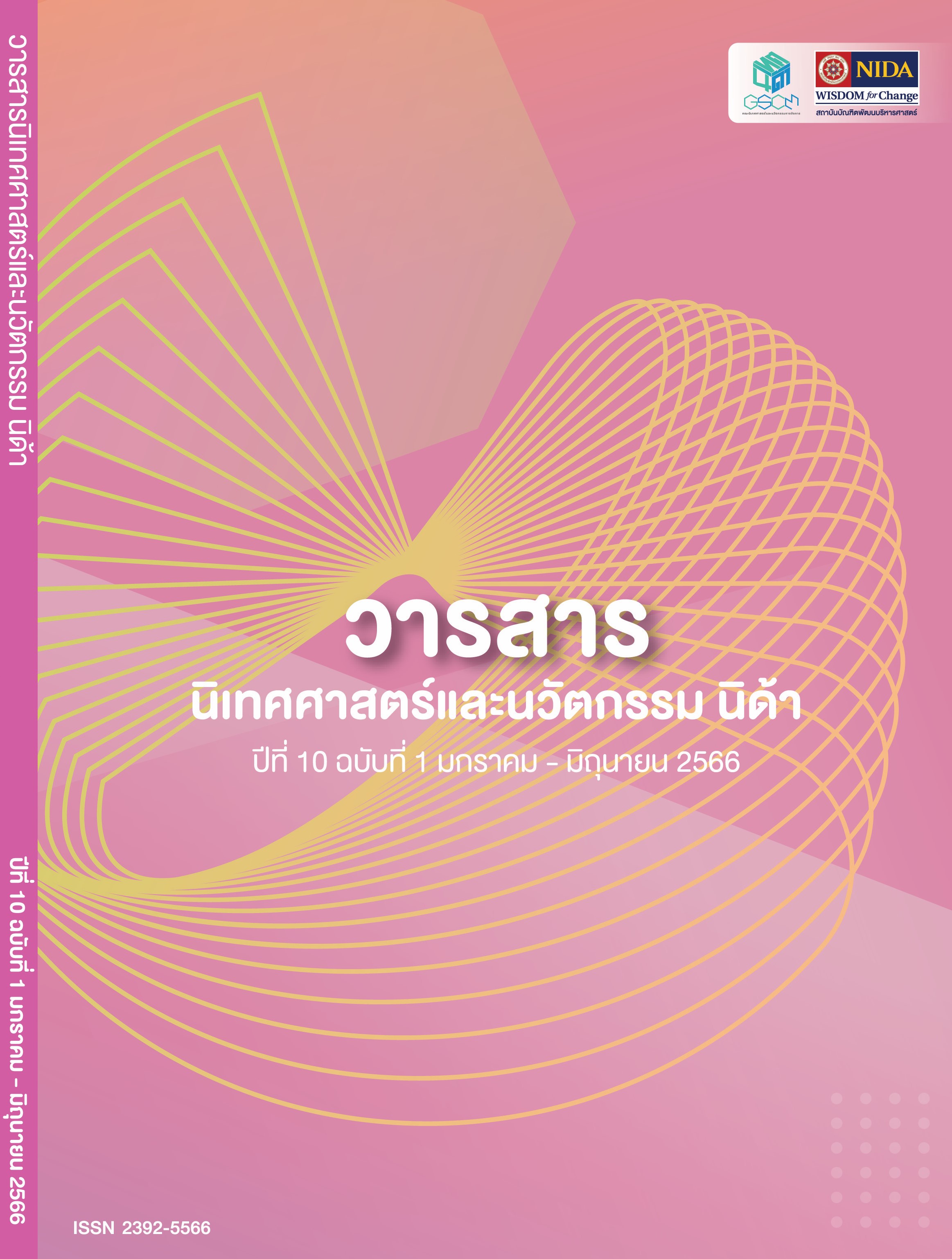Soft Power Strategy in Creative Content Industry with Creative Economy in South Korea
Main Article Content
Abstract
This research proposed to study soft power strategy with creative economy in South Korea to provide fundamental knowledge for developing what could possibly be a soft power strategy for Thailand. The research relies on a qualitative approach, covering document research and analysis of data based on cultural diffusion theory, soft power, and creative economy concept.
It was found that the success of soft power strategy implementation with the creative economy in South Korea has been strongly supported by the Korean government for two decades especially in film, content, and music industries. Korea also had good collaboration from the public and private sectors to push soft power cultural media from local to global market through the statements of Korean president and Korean government policy. Moreover, the Korean government set up the organization to respond to soft power strategies clearly and continually on many levels: national branding, development in media human resources and innovation, cultural public diplomacy, and tourism and cultural exportation.
The Thai government and Creative Economy Agency (CEA) should be responsible for the concept of soft power strategy with creative economy, as Thailand has more cultural materials and opportunity to create soft power for exporting into the global market.
Article Details

This work is licensed under a Creative Commons Attribution-NonCommercial-NoDerivatives 4.0 International License.
ข้อความและความเห็นในวารสารนิเทศศาสตร์และนวัตกรรม นิด้า เป็นของผู้เขียนแต่ละท่าน มิใช่ของคณะนิเทศศาสตร์และนวัตกรรมการจัดการ สถาบันบัณฑิตพัฒนบริหารศาสตร์
References
กรณ์ โรจนวงศ์สกุล. (2563). กรณีศึกษาความสำเร็จของอุตสาหกรรมบันเทิงเกาหลีใต้. วารสารด้านการบริหารรัฐกิจและการเมือง, 11(2), 124-143. https://so03.tci-thaijo.org/index.php/ papojournal/article/view/262809
กิตติ ประเสริฐสุข. (2561). Soft Power ของเกาหลีใต้: จุดแข็งและข้อจำกัด. วารสารเอเชียตะวันออกศึกษา, 22(1), 122-139. https://so02.tci-thaijo.org/index.php/easttu/article/view/144286/106774
กิตติ ประเสริฐสุข. (2566). Soft Power ของจีน ญี่ปุ่น เกาหลี ในอาเซียนและนัยต่อไทย. กรุงเทพฯ: เรือนแก้วการพิมพ์, 384-385.
โครงการจัดทําฐานข้อมูลและแผนพัฒนาอุตสาหกรรมสร้างสรรค์ สำนักเศรษฐกิจสร้างสรรค์. (2563). รายงานแผนภาพอนาคตของอุตสาหกรรมสร้างสรรค์ ฉบับสมบูรณ์. Creative Economy Agency. https://www.cea.or.th/th/single-research/ Thailand-Creative-Industries-Foresight-Report-Vol-2-Full-Report
โครงการจัดทำฐานข้อมูลและแผนพัฒนาอุตสาหกรรมสร้างสรรค์ สำนักเศรษฐกิจสร้างสรรค์. (2563). รายงานการศึกษาการพัฒนาอุตสาหกรรมสร้างสรรค์ ปี 2563: ดนตรี. Creative Economy Agency. https://www.cea.or.th/th/single-industries/Creative-Industries-Development -Report-2020-Music
โครงการจัดทำฐานข้อมูลและแผนพัฒนาอุตสาหกรรมสร้างสรรค์ สำนักเศรษฐกิจสร้างสรรค์. (2563). รายงานการศึกษาการพัฒนาอุตสาหกรรมสร้างสรรค์ ปี 2564: ภาพยนตร์และวีดิทัศน์. Creative Economy Agency. https://www.cea.or.th/th/single-industries/Creative-Industries-Development-Report-2021-Film
จักรกริช สังขมณี. (26 มิถุนายน 2561). อ่านเกาหลีผ่านวัฒนธรรมบันเทิงร่วมสมัย. The101.world. https://www.the101.world/ 101-one-on-one-ep-30-jakkrit/
จิตสุภัค ตันติเกษตรกิจ. (2559). บทบาทของภาครัฐในการส่งเสริมอุตสาหกรรมสื่อบันเทิงของประเทศไทยเพื่อเป็นสินค้าทางวัฒนธรรมในตลาดโลก. สถาบันส่งเสริมการบริหารกิจการบ้านเมืองที่ดี. http://203.113.122.174/ULIB5/dublin.php? ID=650#.Y_x9jHbP02w
ฐณยศ โล่พัฒนานนท์และคณะ. (2564). แนวคิด โครงสร้าง และผลสัมฤทธิ์ของสภาภาพยนตร์แห่งสหราชอาณาจักรและเกาหลีใต้. วารสารการสื่อสารและการจัดการ นิด้า, 7(1), 40-58. http://gscm.nida .ac.th/uploads/files/1645786858.pdf
นพดล อินทร์จันทร์. (2555). ภาพยนตร์ชุดเกาหลี: กรณีศึกษากระแสคลื่นวัฒนธรรมเกาหลีในสังคมไทย. วารสารสถาบันวัฒนธรรมและศิลปะ มหาวิทยาลัยศรีนครินทรวิโรฒ, 14(1) ,132-144, https:// so02.tci-thaijo.org/index.php/jica/article /view/5767/5051
ประภาวี ศิวเวทกุล. (2550). กลยุทธ์การตลาดของผู้นำเข้าศิลปินจากประเทศเกาหลีใต้ในประเทศไทย [วิทยานิพนธ์ปริญญามหาบัณฑิต, คณะวารสารศาสตร์และสื่อสารมวลชนมหาวิทยาลัยธรรมศาสตร์]. https://digital.library.tu.ac.th/tu_dc/frontend/Info/item/dc:103416
พัชรี บอนคำ. (15 กุมภาพันธ์ 2563). อุตสาหกรรมบันเทิง เศรษฐกิจหลักเกาหลีหมัดเด็ดจากรัฐบาล. Urban Creature. https://urbancreature.co/southkorea-koreanwave/
พิริยะ ผลพิรุฬห์. (2556). เศรษฐกิจสร้างสรรค์กับการพัฒนาประเทศไทย. วารสารศาสตร์เศรษฐศาสตร์ปริทรรศน์ สถาบันพัฒนศาสตร์, 7(1), 1-69.
รมิดา จรินทิพย์พิทักษ์. (2560). บริการ OTT: ความท้าทายต่อสื่อเก่าและการกำกับดูแล. The Journal of the National Broadcasting and Telecommunication Commission (NBTC), 1(1), 316–341. https://so04.tci-thaijo.org/ index.php /NBTC_Journal/article/view/116011
วริศรา ภาคมาลี. (2563). การทูตสาธารณะ: เครื่องมือ soft power ของเกาหลีใต้ กรณีศึกษา การทูตวัฒนธรรม [วิทยานิพนธ์ปริญญามหาบัณฑิต, คณะรัฐศาสตร์ (การเมืองการปกครอง) มหาวิทยาลัยธรรมศาสตร์]. Thammasart University Library. http://ethesisarchive.library. tu.ac.th/thesis/2020/TU_2020_6203011439_13304_13622.pdf
โศลดา รชตะพฤกษา. (2555). กลยุทธ์การสร้างสารเพื่อวางตําแหน่งแห่งที่ของเกาหลีใต้ในบริบทโลกผ่านสถานีโทรทัศน์ Arirang [วิทยานิพนธ์ปริญญามหาบัณฑิต, คณะวารสารศาสตร์และสื่อสารมวลชน มหาวิทยาลัยธรรมศาสตร์]. TU Digital Collection. https://digital.library.tu.ac.th/tu_ dc/frontend/Info/item/dc:108892
สำนักงานส่งเสริมเศรษฐกิจสร้างสรรค์. (2565). เศรษฐกิจสร้างสรรค์ x นวัตกรรม สู่การผลักดัน Soft Power ไทย ให้ “ขายได้” และ “ขายดี”. สำนักงานส่งเสริมเศรษฐกิจสร้างสรรค์. https://www.cea.or.th/ th/single-softpower/creative-economy-thailand-2022
เอกศาสตร์ สรรพช่าง. (5 เมษายน 2564). เศรษฐศาสตร์ว่าด้วยการเต้นกินรำกินแบบเกาหลีใต้. The101.world. https://www.the101. world/101-one-on-one-ep-30-jakkrit/
WorkpointTODAY. (3 มิถุนายน 2562). “รัฐบาลประกาศหนุน คนทั้งประเทศก็ให้ความร่วมมือ” ถอดเกร็ดความสำเร็จ บันเทิงเกาหลี. WorkpointTODAY. https://workpointtoday.com/interview-cjm1/
WorkpointTODAY. (14 ตุลาคม 2564). ‘Squid Game’ ทุบสถิติด้วยยอดผู้ชมทะลุ 111 ล้านบัญชี ขึ้นแท่นซีรีส์ยอดนิยมตลอดกาลบน Netflix. WorkpointTODAY. https://workpointtoday.com/ squid-game-111-million-view/
Ayhan, K. J. (2019). Rethinking Korea's middle power diplomacy as a nation branding project. Korea Observer, 50(1), 1-24.
Campbell, J. W. (2008, April 18). Korean film council: Diversified support. Culture360. https://culture360.asef.org/ magazine/korean-film-council-diversified-support/
Choi, D., & Kim, P. (2014). Promoting a policy initiative for national branding: The case of South Korea. Journal of Comparative Asian Development, 13(2), 346 – 368.
International Federation of the Phonographic Industry (IFPI). (2015). IFPI digital music report 2015 charting the path to sustainable growth. Music Industry Journal, 1(1), 8-9.
International Federation of the Phonographic Industry (IFPI). (2023). Global music report 2023. IFPI. https://ifpi-website-cms.s3.eu-west-2.amazonaws.com/GMR_2023_State_ of_the_Industry_ee2ea600e2.pdf
Goldstein, M., King G. and Wright M. (2010). Diffusionism and acculturation. Department of Anthropology, the University of Alabama. https://anthropology.ua.edu/theory/ diffusionism-and-acculturation/
Kim, S. (11 January 2023). The changing korean media landscape. NBTC. https://www.nbtc.go.th/ News/Information/ 58260.aspx?lang=th-th
Lee, H. K. (2013). The Korean wave. Routledge.
Lee, S. J. (2009). South Korea’s soft power diplomacy. EAI, 1-8.
Min-Soo, S. (2017, November 30). Lesson from K-pop’s global success. SERI Quarterly, 5(3), 60-69. https://silo.tips/ download/lessons-from-k-pop-s-global-success
Nye Jr, J. S. (2004). Soft power: The means to success in world politics. Public Affairs. https://www.academia.edu/28699788/Soft_Power_the_Means_to_Success_in_World_Politics_Joseph_S_Nye_Jr
Oh, I., & Rhee, H. (2013). Mass media technologies and popular music. Korea Journal, 53(4), 34 – 58.
Parc, J. (2014). A retrospective on the Korean film policies: Return of the Jedi. ECIPE. https://ecipe.org/publications/retrospective-korean-film-policies-return-jedi/
Petasen, P., Janjula, J. (2020). Korean wave 4.0. Journal of Liberal Arts, Prince of Songkla University, 12(2), 15-16.
Ramasoota, P., & Kitikamdhorn, A. (2021). “The Netflix effect” in Thailand: Industry and regulatory implications. Telecommunications Policy, 45(7), 102156. https://doi.org/ 10.1016 /j.telpol.2021.102156
Roll, M. (2018). Korean wave (Hallyu)–The rise of Korea’s cultural economy & pop culture. Martin Roll: Business & Brand Leadership. Martin Roll. https://martinroll.com/resources/ articles/asia/korean-wave-hallyu-the-rise-of-koreas-cultural-economy-pop-culture/
Sung, N., & Kim, M. (2023). COVID-19 and changes in content usage behavior: The case of South Korea. Telecommunications Policy, 47(1). https://doi.org/10.1016/j.telpol.2022.102461.
Yim, H. (25 April 2023). Netflix to invest $2.5 billion in South Korea to make TV shows, movies. Reuters. https://www.reuters.com/technology/netflix-invest-25-bln-south-korea-make-tv-shows-movies-2023-04-25/


